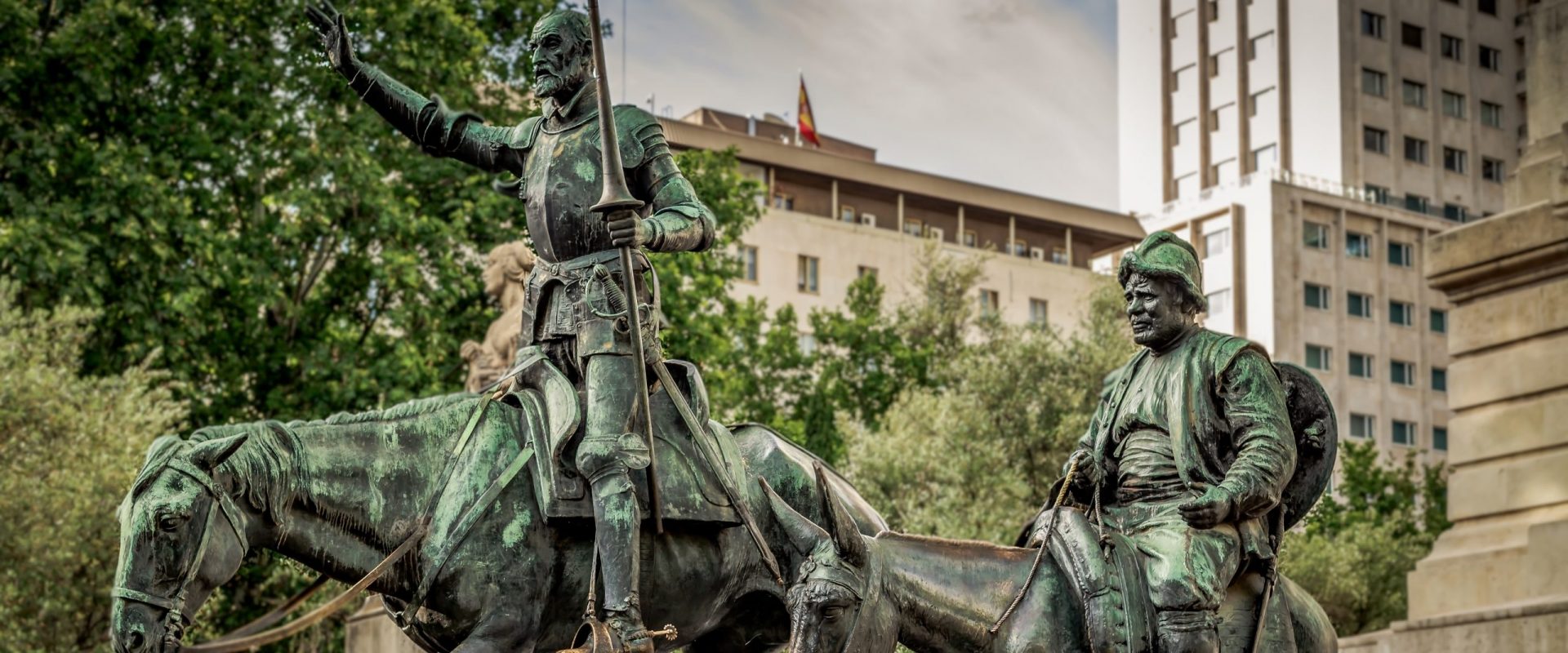Quixote and leadership – why we do what we do
Contents
Quixote and leadership – why we do what we do
But what, however, does Quixote have to do with leadership and organisation and all that with existential thinking?
Here we find the answer in a classic of organisational research, James G. March, one of the outstanding representatives of behavioural decision theory. In his works, he mainly deals with decision‐making practice in organisations. One of his central themes is the demonstration that the notion of consistently purpose‐rational organisational processes ›dripping down‹ from the overall purpose of the organisation and are ›reflected‹ there harmoniously and fractally as the contents of the sub‐purposes, is a ›fantastic‹ idea in the literal sense of the word which is often cultivated within leadership practice and management literature. (March, 1988).
In his lectures, he repeatedly refered to the value of linking and reconnecting management education to so‐called ›great literature‹. Every work of great literature could fulfil this task. And he points in particular to the works of Ibsen, Dostoevsky and Henry James, for example. In 2003, March translates part of his leadership course into a film entitled »Passion and Discipline: Don Quixote’s Lessons for Leadership« in which he creates a monument of almost tender reverence to the figure of the man from La Mancha. (March & Mooney, 2014).
In his focus on Quixote, March attests that he is hardly a role model for good leadership. Nevertheless, he offers a basis for reflecting on what justifies great action and for understanding ›why we do what we do‹. In his response to this, March, together with Quixote, so to speak, takes a surprising lunge that momentarily shakes the entire cosmos of economic certainties. For he questions nothing less than its gravitational principle, the consequentialism of results. According to this principle, the judgement about an action and its effort is made in the estimation and expectation of the result. Our default response, according to March, is to do what we do because we expect it to yield a good return. But Quixote reminds us that there is another, a second possible answer: »We do what we do because it fulfils our identity, our sense of self. Identity‐based actions protect us from the discouragement of disappointing feedback. … our usual conversations – particularly in business settings and schools – tend to … forget the second.« (Zich, 2003).
So, like for James March, Quixote, the Man of La Mancha, can become a teacher and ›leader‹ to us, not because he is the personification of a leader. He certainly isn’t. We refer to him because – as March spells it out – he sheds light on three themes of modern leadership and modern life: First, on the role of imagination and vision. Second, on the sources of perseverance and commitment. And, third, on the possibility of happiness of the deep feelings of the spirit that goes beyond self‐indulgent sensations. (Peterson, 2017).
_______________________________________
Bibliography:
Bollnow, Otto F. (1949). Existentialismus und Ethik. Erschienen in: Die Sammlung, 4. Jahrg., 6. Heft, Juni 1949.
Camus, Albert (1942). Der Mythos des Sisyphos, Reinbek. 15. Auflage (Neuübersetzung) von 2013.
Cervantes Saavedra, Miguel de (2005). Der Sinnreiche Junker DON QUIJOTE von der Mancha. Aus dem Spanischen von Ludwig Braunfels. München.
Dorra, Helmut (2021). Zweck an sich selbst – niemals nur Mittel zum Zweck. Die Person und ihre Würdigung im Miteinander der Menschen. (Zäsuren und Zeugnisse einer
ethisch fundierten Anthropologie). Vortragsmanuskript zum »GLE‑D Wintersymposium – Zur Person«.
Frankl, Viktor E. (1985). Der Mensch vor der Frage nach dem Sinn. München.
Frerichs, Joke (2016) https://www.blog-der-republik.de/der-idealist-und-der-zweifler-don-quijote-und-hamlet-zwei-exemplarische-modellfiguren-fuer-die-verwirrungen-der-beginnenden-moderne/; access 2021, March 3.
Heine, Heinrich (1837/1976): Miguel de Cervantes Saavedra: Der sinnreiche Junker Don Quijote von la Mancha. Einleitung, in: ders.: Sämtliche Schriften in zwölf Bänden. Herausgegeben von Klaus Briegleb. Bd. 7: 1837‒1844. München. S. 149‒170. S. 165 [our italics]. See more: Meyer‐Minnemann, Klaus (2007). Zur Entstehung, Konzeption und Wirkung des Don Quijote in der europäischen Literatur; in: Altenberg, Tillmann & Meyer‐Minneman, Klaus (Hrsg.). Europäische Dimensionen des Don Quijote in Literatur, Kunst, Film und Musik. Hamburg. S. 11–46.
Lukács, Georg (1916). Die Theorie des Romans [II]: Ein geschichtsphilosophischer Versuch über die Formen der großen Epik; in: Zeitschrift für Ästhetik und allgemeine Kunstwissenschaft | Zeitschrift für Ästhetik und allgemeine Kunstwissenschaft – 11 | Heft 4. http://www.digizeitschriften.de/download/urn:nbn:de:bsz:16-diglit-38175/urn:nbn:de:bsz:16-diglit-38175___log00030.pdf
March, James G. (1988). Bounded Rationality, Ambiguity, and the Engineering of Choice. In: Ders. (Hg.): Decisions and Organizations. Oxford. S. 266–293. For a short introduction: Kühl, Stefan (2017). James March. Die Zerlegung des zweckrationalen Modells der Organisation. https://sozialtheoristen.de/2017/05/19/james-march-die-zerlegung-des-zweckrationalen-modells-der-organisation/#_ftn2 ; access 2021, March 3.
March, James G. & Mooney, Loren (2014). James March: What Don Quixote Teaches Us About Leadership. https://www.gsb.stanford.edu/insights/james-march-what-don-quixote-teaches-us-about-leadership ; access 2021, March 3.
Nabokov, Vladimir (2016). Vorlesungen über Don Quijote, übersetzt von Dieter E. Zimmer, herausgegeben von Bowers, Fredson: Nabokov: Gesammelte Werke, Band 19. Hamburg.
Ortega y Gasset, José (2008). Einleitung in: Der Mensch ist ein Fremder, Schriften zu Metaphysik und Lebensphilosophie, übersetzt aus dem Spanischen von Stascha Rohmer (Hg.). Freiburg/München.
Peterson, Rob (2017). Modern Leadership Lessons From Don Quixote. https://medium.com/@standardoftrust/modern-leadership-lessons-from-don-quixote-16e36a41174 ; access 2021, March 3.
Unamuno, Miguel de (1926) Das Leben Don Quijotes und Sanchos. Deutsche Übertragung von Otto Buek. München.
Zich, Janet (2003). https://www.gsb.stanford.edu/insights/don-quixotes-lessons-leadership ; access 2021, March 3.

